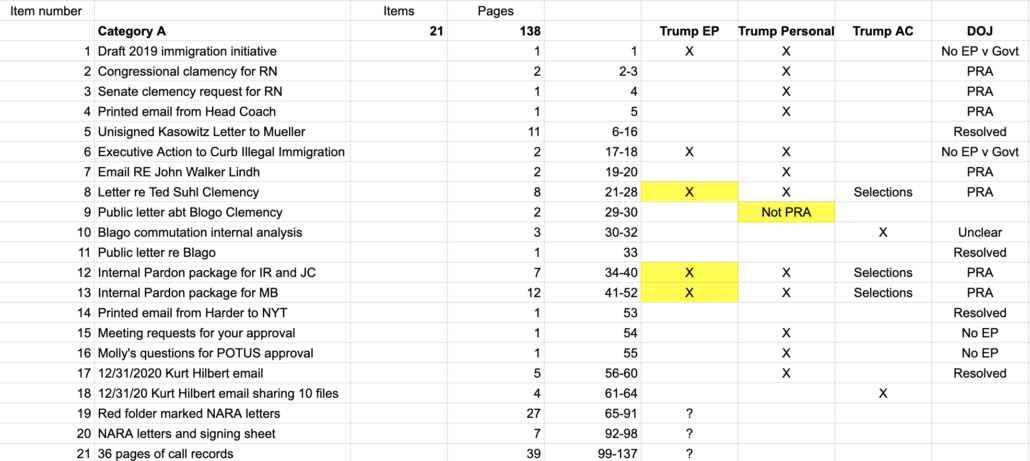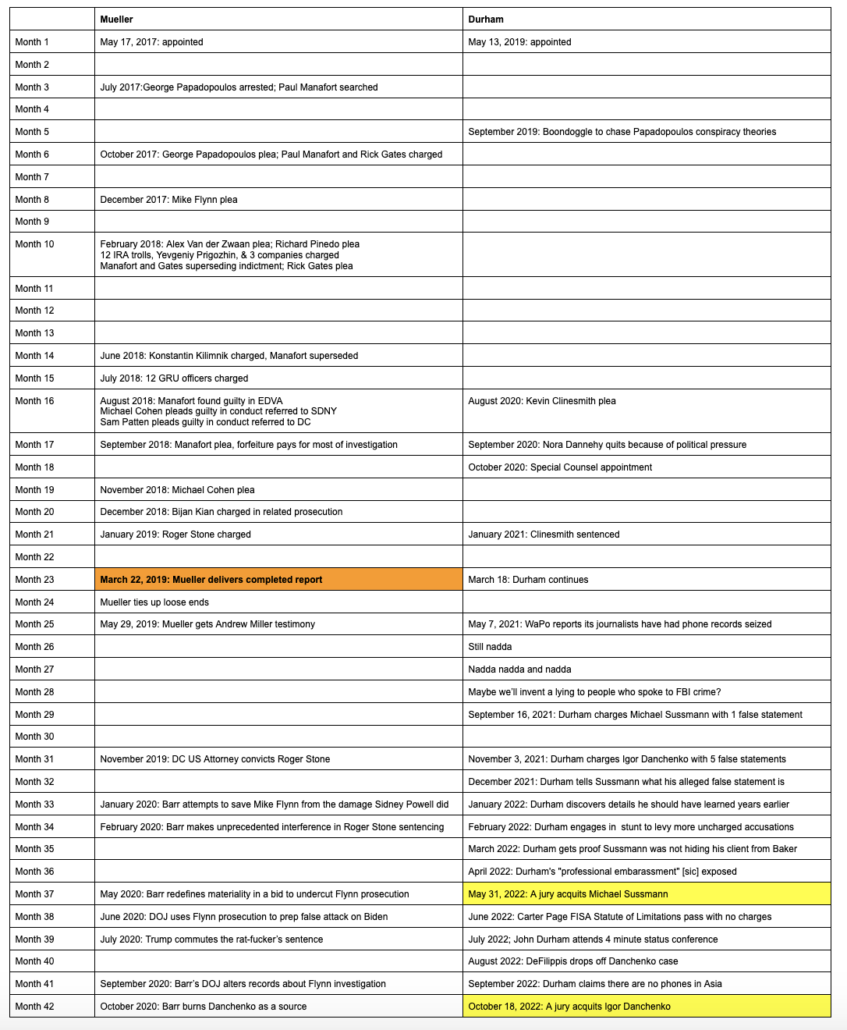Bill Barr Complains that His Special Counsel Was Unable to Match Robert Mueller’s Record of Success
Even before the Igor Danchenko trial, Billy Barr declared victory in defeat — arguing that if John Durham could just “fill in a lot of the blanks as to what was really happening,” the inevitable acquittal would still give Durham an opportunity to spin fairy tales about what Durham imagines happened.
“What these cases show is that these are difficult cases to win,” Barr said. “There’s a reason it takes so long, and you have to build up the evidence because at the end of the day, you’re going before these juries that aren’t going to be disposed to side with the people they view as supporting Trump.”
Danchenko is slated to go on trial next month on charges of lying to the FBI about the Steele dossier, for which he was the main source. The dossier claimed that Trump and members of his campaign and company had established extensive ties to the Russian government and had colluded during the 2016 election.
The trial is widely expected to be the final criminal prosecution from Durham’s investigation before he submits a report of his findings to Attorney General Merrick Garland.
But despite Durham’s limited success in the courtroom, Barr defended the investigation he ordered, saying the courtroom was allowing Durham to establish a record of what had occurred with the so-called Russiagate investigation.
“I think Durham got out a lot of important facts that fill in a lot of the blanks as to what was really happening,” Barr said. “My expectation is … the Danchenko trial will also allow for a lot of this story to be told, whether or not he’s ultimately convicted. I hope he’s convicted, but if he isn’t, I still think it provides an avenue to tell the story of what happened.”
Like an obedient puppy, Durham did use the trial as an opportunity to get extraneous details into the public record. On top of the $1 million dollar offer that Brian Auten said, vaguely, Christopher Steele might have gotten if he had corroborated the dosser — which has been treated like an FBI attempt to bribe a source for dirt on Trump and as the most exonerating possible detail, rather than an effort to investigate a real threat to the country — Durham went out of his way to give the full names of people at various meetings so Carter Page and Donald Trump can add them to lawsuits.
Mind you, along the way, the trial also revealed the FBI’s own assessment of Danchenko’s cooperation, which contributed to 25 investigations and which Barr burned to a crisp by exposing him, with Lindsey Graham’s help, as a source in 2020.
Q. And you were concerned, in July of 2020, when you became aware that Attorney General Barr was going to release a redacted version of Mr. Danchenko’s interview in January of 2017?
A. Yes.
Q. You were upset about that?
A. I was.
Q. You found out about that during a telephone conference, right?
A. I did.
Q. And you disagreed with that decision?
A. I did.
Q. The OIG had already completed a report on that investigation, correct?
A. Yes.
Q. And you thought that the release of that document was dangerous?
A. Yes.
Q. You even wrote up a memo of that phone call you were on in July of 2020 where you learned that they were going to publish a redacted version of his interview, correct?
A. I did.
[snip]
Q. And within an hour of Mr. Danchenko’s January interview being released to the senate judiciary committee, the senate judiciary committee, I won’t say who, released it to the public?
A. They did.
[snip]
Q. So, Agent Helson, you wrote in October of 2020 that from 2017 until present day, Mr. Danchenko had provided information on at least 25 FBI investigations assigned to at least six field offices?
A. Correct.
Q. In addition, he aided the United States Government by introducing the United States Government to a sub-source who had provided additional information separate to his report, correct?
A. Correct.
[snip]
Q. And it’s noted that he — his reporting contributed to at least 25 active FBI investigations.
[snip]
Q. In July of 2020 his identity became public after the release of the redacted version of his interview in January of 2017. Since that public disclosure, he has received threatening messages via social media and email. It’s resulted in significant damage to his reputation from false and baseless claims aimed to undermine his credibility. Those are your words, correct?
A. Correct.
Q. The Washington Field Office had assessed that this will have negative ramifications with respect to his ability to provide for his family via personal income for the foreseeable future, correct?
A. Correct.
Q. And while the FBI cannot promise complete anonymity to anyone who provides information, his identity became public only after the decision was made to release the redacted version of his interview, correct?
A. Correct.
Q. As a result of that act, his ability to continue to provide information viable to the FBI is diminished as is his ability to provide financial support to his family.
After the trial, Barr has been spending time on Fox News declaring — as much of the frothy right has — that this record, of how he deliberately harmed national security for revenge, exposed the corruption of what Barr calls “Russiagate,” the moniker frothers use to distract from the real substance of the Russian investigation.
I was disappointed, obviously. I think they did a good job prosecuting the case. Their ability to put evidence on, in a very difficult case, was limited by some rulings, and they weren’t able to get access to some witnesses overseas. So it was a tough — it was a tough case, so this should show people that it’s hard to win these cases, and sometimes it takes time to … to achieve justice. But as people say — I think Andy McCarthy said — the real public interest being served here was exposing the full extent of the corruption that was involved in Russiagate [sic] and the abuse by the FBI in that whole episode. And I think Durham is going to get a report out that’s gonna lay out all the facts.
Barr and everyone else are pointing to the exposures they and Durham made to justify their actions because they didn’t have evidence to support their claims.
Barr is whining that getting false statements convictions is hard. But Robert Mueller was able to prove that:
- Alex Van der Zwaan lied to cover up his efforts, in conjunction with Konstantin Kilimnik and Rick Gates, to cover up Manafort’s effort to spin Ukraine’s politicized Yulia Tymoshenko prosecution during the 2016 election
- George Papadopoulos lied to cover up his advance knowledge of the Russian effort to help Trump
- Mike Flynn lied to cover up his back channel calls with Sergei Kislyak to undermine Obama Administration policy (and also that he was a paid agent of Turkey during the campaign)
- Michael Cohen lied to hide the secret negotiations he had directly with the Kremlin about an impossibly lucrative real estate deal
- Paul Manafort conspired to cover up a front organization he set up with Konstantin Kilimnik and (at a preponderance of the evidence standard) lied to cover up his August 2016 meeting with Kilimnik
- Roger Stone lied and intimidated Randy Credico to cover up his real back channel to the Russian operation
I mean, Robert Mueller had no problem getting convictions, whether from guilty pleas, jury verdicts, or (in the case of Manafort’s lies about the August 2, 2016 meeting) a judge’s ruling.
One reason he had no problem was that these defendants were generally guilty of a lot more than just lying. It’s a lot easier to get Flynn to admit he lied about his back channel discussions with the Russian Ambassador, after all, when he was also on the hook for secretly being an agent of Turkey. It’s lot easier to get Papadopoulos to admit he lied about his advance warning of the Russian operation when he’s trying to stave off foreign agent charges tied to Israel. It’s a lot easier to get a jury verdict against Stone when he spent months plotting out his lies with multiple people on emails.
Mueller wasn’t able to get false statement verdicts from everyone, mind you. For example, because Steve Bannon and Erik Prince deleted their texts from early January 2017, Mueller did not charge them for false statements made to cover up meetings to set up a back channel with UAE and Russia. That’s one lesson that Durham should have taken to heart: Absent the mobile app records from Sergei Millian and Igor Danchenko, he had no way of knowing whether Millian called Danchenko on July 26, 2016.
That’s not the only evidentiary complaint Barr makes here. He’s complaining that Durham was unable to get hearsay admitted against Danchenko. He’s angry that Durham was not permitted to introduce Millian’s wild Twitter boasts as evidence without requiring Millian to show up and make those claims under oath. And he’s complaining that Durham wasn’t able to introduce his pee tape conspiracies without charging it.
But the most alarming of the former Attorney General’s statements — before and after the trial — embrace the notion that it is a proper goal of failed prosecutions to expose information that does not rise to the level of criminality.
As I’ll show in a follow-up, the Durham fiasco is part of a piece of Barr’s larger actions, both his other failed prosecutions — most notably, that of Greg Craig — but also his efforts to undo the convictions for which there was no reasonable doubt of guilt.
It’s not enough to talk about Durham’s unprecedented failure … it’s not enough to note that Durham and his prosecutors repeatedly failed to take basic investigative steps before embracing and charging conspiracy theories that juries didn’t buy … it’s not enough to note how, in an attempt to prove those conspiracy theories, Durham and his prosecutors and abused the prosecutorial system.
Durham’s entire project is a continuation of Barr’s unprecedented politicization of DOJ, one that not only places Republicans attempting to secretly work for hostile nations above the law, but that has made the country far less safe in many other ways.
It’s not just Durham prosecuted two men without any real hope of winning conviction, all to expose things that aren’t crimes. It’s that Billy Barr hired him to do just that.





